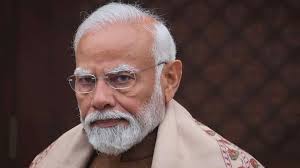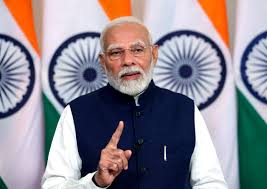Biography of Prime Minister Narendra Modi
Early Life and Background
- Full Name: Narendra Damodardas Modi
- Date of Birth: September 17, 1950
- Place of Birth: Vadnagar, a small town in Mehsana district, Gujarat, India
- Parents: Damodardas Mulchand Modi (father) and Hiraben Modi (mother)
- Siblings: Narendra Modi is the third of six children in a modest family.
Narendra Modi was born into a middle-class family of grocers. His early life was marked by hardship, and he helped his father sell tea at Vadnagar railway station. Despite financial constraints, he was a diligent student and showed an early interest in debates and theater.
Education
- Schooling: Attended local schools in Vadnagar.
- Higher Education: Completed his schooling but left home at the age of 17 to travel across India, visiting religious centers and exploring diverse cultures.
- Degree: Earned a Bachelor’s degree in Political Science from Delhi University (1978) and a Master’s degree in Political Science from Gujarat University (1983).
Early Career and Entry into Politics
- RSS Affiliation: Modi joined the Rashtriya Swayamsevak Sangh (RSS) in his early teens, where he underwent training and developed his ideological foundation.
- Full-Time Worker: In 1971, he became a full-time worker (pracharak) for the RSS, dedicating himself to the organization’s activities.
- BJP Involvement: Modi joined the Bharatiya Janata Party (BJP) in 1987 and quickly rose through the ranks due to his organizational skills and dedication.
Political Career in Gujarat
- Organizational Roles: Modi played a key role in strengthening the BJP’s presence in Gujarat.
- Chief Minister of Gujarat:
- First Term: Appointed Chief Minister of Gujarat in October 2001, following the resignation of Keshubhai Patel.
- Re-elections: He was re-elected as Chief Minister in 2002, 2007, and 2012, serving four consecutive terms.
- Achievements: Modi’s tenure as Chief Minister was marked by economic growth, infrastructure development, and initiatives like the Vibrant Gujarat Summit, which attracted global investments. However, his tenure was also controversial due to the 2002 Gujarat riots.
Prime Minister of India
- 2014 General Elections: Narendra Modi led the BJP to a historic victory in the 2014 Lok Sabha elections, securing a majority on his own for the first time in 30 years.
- Campaign Slogan: “Sabka Saath, Sabka Vikas” (Together with All, Development for All).
- Key Issues: Focused on development, corruption-free governance, and economic reforms.
- 2019 General Elections: Modi led the BJP to an even larger victory in 2019, securing a second term as Prime Minister.
- Campaign Slogan: “Phir Ek Baar, Modi Sarkar” (Once Again, Modi Government).
- Key Issues: National security, economic growth, and welfare schemes.
Key Initiatives and Policies as Prime Minister
- Economic Reforms
- Goods and Services Tax (GST): Implemented in 2017 to unify India’s tax system.
- Demonetization: In November 2016, Modi announced the demonetization of ₹500 and ₹1000 currency notes to combat black money and corruption.
- Make in India: A campaign to promote domestic manufacturing and attract foreign investment.
- Digital India: Aimed at transforming India into a digitally empowered society.
- Social Welfare Schemes
- Swachh Bharat Abhiyan: A nationwide cleanliness campaign to eliminate open defecation and improve sanitation.
- Pradhan Mantri Jan Dhan Yojana: Financial inclusion program to provide banking services to the unbanked.
- Ayushman Bharat: World’s largest government-funded healthcare program, providing health insurance to millions.
- Ujjwala Yojana: Provided free LPG connections to women from below-poverty-line households.
- Foreign Policy
- Neighborhood First Policy: Strengthened ties with neighboring countries.
- Act East Policy: Enhanced engagement with Southeast Asia and East Asia.
- Global Outreach: Modi has been a prominent global leader, advocating for climate change action (e.g., International Solar Alliance) and strengthening India’s ties with major powers like the USA, Russia, and Japan.
- Infrastructure Development
- Smart Cities Mission: Aimed at developing 100 smart cities across India.
- Bharatmala and Sagarmala Projects: Focused on improving road and port connectivity.
- National Security
- Surgical Strikes (2016): Conducted across the Line of Control in response to terrorist attacks in Uri.
- Balakot Airstrike (2019): In response to the Pulwama terror attack.
Personal Life
- Marital Status: Narendra Modi was married to Jashodaben Modi at a young age, but the couple separated soon after. He has lived a largely ascetic life, dedicating himself to public service.
- Lifestyle: Known for his disciplined lifestyle, Modi is a vegetarian and practices yoga regularly.
Awards and Recognition
- Time Magazine: Named one of the 100 Most Influential People in the World multiple times.
- UN Champions of the Earth Award: Awarded in 2018 for his leadership in promoting solar energy.
- Global Leadership: Modi has been a prominent voice on global platforms like the G20, UN, and World Economic Forum.
Controversies and Criticisms
- 2002 Gujarat Riots: Modi’s handling of the riots during his tenure as Chief Minister has been a subject of criticism and legal scrutiny.
- Demonetization: While aimed at curbing black money, the move faced criticism for its implementation and impact on the economy.
- Farm Laws (2020): The introduction of farm laws led to widespread protests, eventually resulting in their repeal in 2021.
Legacy
Narendra Modi is one of India’s most influential and polarizing leaders. His tenure as Prime Minister has been marked by bold reforms, economic growth, and a focus on India’s global standing. While his policies have garnered both praise and criticism, his leadership has undeniably shaped India’s trajectory in the 21st century.

